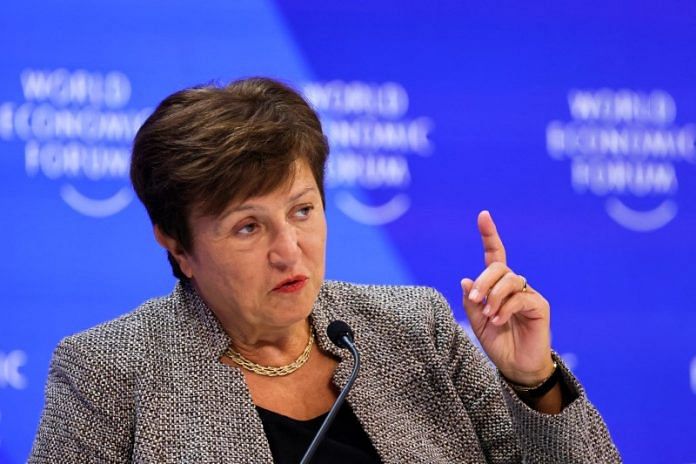By David Lawder
(Reuters) -International Monetary Fund Managing Director Kristalina Georgieva said on Wednesday that countries need to shift some $7 trillion in direct and indirect annual subsidies for fossil fuels to help finance the fight against climate change.
Georgieva told the World Economic Forum in Davos, Switzerland that the total fossil fuel subsidies include $1.3 trillion in direct government subsidies as well as indirect subsidies that include failure to price carbon emissions, adding that this price needs to be set at $85 per ton by 2030.
Pricing carbon at 25% of that rate would generate $800 billion in funds that could be used to abate climate change, while a 50% rate would generate $1.5 trillion, she said during a climate panel that also featured World Bank President Ajay Banga.
“So my point is let’s get to bringing resources, taking them from where they hurt to putting them where they help,” Georgieva said.
She added that the IMF was incorporating emission-reduction goals into its macroeconomic policy discussions with high emitting countries and climate adaptation goals with vulnerable countries.
Banga told the forum that the world “cannot afford another set of decades of emissions-heavy growth,” and leaders must increase the urgency to find ways to finance clean energy sources and clear the way for private capital to invest.
“We cannot be the ones who do all these projects and put them on our balance sheet. Our balance sheets are finite,” Banga said.
He added that the World Bank was taking steps to mitigate political risk, with a goal to increase political risk guarantees to $20 billion per year by 2030 from the current $6 billion to $7 billion.
Regulatory uncertainty and foreign exchange risks also are standing in the way of private investment in the energy transition in many countries, and the World Bank can help absorb some of that risk, he said.
“These countries don’t have hedging markets that are either wide enough or deep enough. Institutions like ours have got to find a way to come in to help fill that gap,” Banga added.
(Reporting by David Lawder; Editing by Paul Simao)
Disclaimer: This report is auto generated from the Reuters news service. ThePrint holds no responsibilty for its content.



